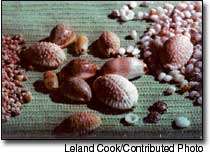Bill would prohibit ‘Ni‘ihau’ label from appearing on non-Ni‘ihau jewelry
To state Rep. Mina Morita and many other people, a Ni‘ihau-shell lei is one made by people from Ni‘ihau with shells collected from Ni‘ihau.
A bill moving in the state Legislature would prohibit the “Ni‘ihau” label from being hung on jewelry whose shells don’t come from Ni‘ihau.
“For me, a Ni‘ihau-shell lei is a lei made by someone with Ni‘ihau ties, with Ni‘ihau shells,” said Morita, D-North Kaua‘i.
For the purposes of House Bill 2569, House Draft 1, any product or jewelry item manufactured with seashells shall not contain the word “Ni‘ihau” in printed materials describing them unless 100 percent of the shells were “harvested from the island of Ni‘ihau, its waters or its beaches; and the product or jewelry item is fabricated, processed, or manufactured entirely within the state.”
The bill also allows for items made with at least 80 percent Ni‘ihau shells to be labeled as from Ni‘ihau as long as the content percentage is indicated.
The purpose of the bill is to prevent the deceptive use of the word “Ni‘ihau” in the marketing of shell products.
The bill passed the state House, and is scheduled for a public hearing today before a state Senate committee.
“There are unscrupulous merchants who appropriate the name in order to obtain the premium price without providing a high-quality product,” a House committee report reads.
“It is the intent of this bill to protect consumers from deception, and assure that the market for Ni‘ihau-shell products is not debased by unscrupulous merchants.”
Morita, a co-sponsor of the bill, said she had been toying with the idea of introducing some form of legislation to protect the Ni‘ihau-shell-lei industry through a “labeling requirement” or some similar law.
But state Rep. Jon Riki Karamatsu, D-Waipahu, who is also a distributor of Hawai‘i products, felt compelled to introduce the legislation after seeing inferior products for sale labeled as “Ni‘ihau-shell leis,” Morita said.
Morita has come in contact with a person who has been inserting microchips into Native American jewelry in order to identify high-quality goods made by Native Americans on the Mainland, she said.
“This is a good first step,” she said of the pending legislation in Honolulu regarding Ni‘ihau-shell jewelry.
Associate Editor Paul C. Curtis may be reached at 245-3681 (ext. 224) or mailto:pcurtis@pulitzer.net.

